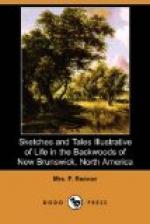wool, and if they are not industrious the yarn will
not be spun for this much-prized coverlet, which, despite
the local importance attached to it, is a useful, handsome
and valuable article in itself. On a large chest
beside the bed are laid piles of snow white blankets,
and around the walls are hung the various woollen
garments which form the wardrobe of the family.
Bright-hued Indian baskets stand on top of each other—a
pair of beaded moccasins and a reticule of porcupine
quills are hung up for ornament. The pine table
and willow-seated chairs are all made in the “bush,”
and even into this far back settlement has penetrated
the prowess of the renowned “Sam Slick, of Slickville.”
One of his wooden-made yankee clocks is here—its
case displaying “a most elegant picture”
of Cupid, in frilled trowsers and morocco boots, the
American prototype of the little god not being allowed
to appear so scantily clad as he is generally represented.
A long rifle is hung over the mantle-piece, and from
the beams are suspended heads of Indian corn for seed;
by them, tied in bunches, or in paper bags, is a complete
“hortus siccus” of herbs and roots for
medicinal as well as culinary purposes. Bone set
and lobelia, sage and savory, sarsaparilla, and that
mysterous bark which the natives say acts with a different
effect, according as it is peeled up or down the tree—cat-nip
and calamus root for the baby, with dried marigold
leaves, balm of gilead buds, and a hundred others,
for compounding the various receipts they possess,
as remedies for every complaint in the world.
Many of these they have learnt from the Indians, whose
“ancient medicine men” are well versed
in the healing powers with which the herbs of the
forest and the field are gifted. On a small shelf
is laid the library, which consists but of the bible,
a new almanac, and Humbert’s Union Harmony,
the province manual of sacred music, of which they
are most particularly fond; but the air of the country
is not favourable to song, and their melody always
seemed to me “harmony not understood,”
Meanwhile, for the last half-hour, Sybel has been busily
engaged in cooking, at which the natives are most
expeditious and expert. I know not how they would
be in other countries, but I know that at home they
are first-rate—no other can come up to them
in using the materials and implements they are possessed
of. By the accustomed sun-mark on the floor,
which Sybel prefers to the clock, she sees ’tis
now the hungry hour of noon, and blows the horn for
Lank to come to dinner. This horn is a conk shell,
bored at one end, and its sound is heard at a great
distance. At the hours of meal-time it may be
heard from house to house, and, ringing through the
echoing woods from distant settlements, telling us,
amid their loneliness, of happy meetings at the household
board; but it comes, too, at times, when its sounds
are heralds of trouble and dismay. I have heard
it burst upon the ear at the silent hour of midnight,
and, starting from sleep, seen the sky all crimsoned




